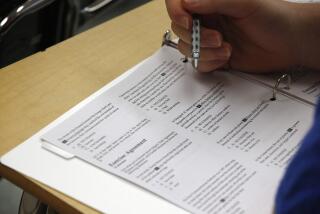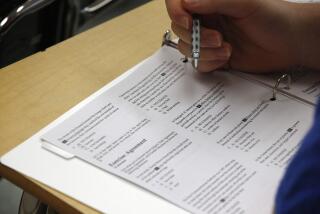Keeper of the Scores : For SAT Preparation, Kennedy’s Lertzman Is the Region’s Go-to Gal
- Share via
GRANADA HILLS — The parallel between athletic contests and college entrance exams is obvious: Scores determine the winners and losers.
But the similarities don’t end there, according to Lynne Lertzman, a Kennedy High English teacher who specializes in preparing athletes for the Scholastic Assessment Test.
“Athletes know all about the importance of preparation and positive thought, yet they often don’t carry over those attributes to test-taking,” she said. “Negativity works against you. You can’t go to a coach and say, ‘We are going to lose.’ He won’t keep you around.
“It’s the same with the test. If you go in saying, ‘I’m too stressed,’ you won’t be successful.”
And as with athletics, there is no substitute for hard work.
“All athletes can do decently on college entrance exams if they practice strategies and condition themselves with consistent exposure to questions and sample tests,” Lertzman said.
Lertzman feels at home with athletes because she is married to a longtime City Section coach, Dave Lertzman, football coach at Birmingham.
“Lynn is tireless,” said Kennedy football Coach Bob Francola, who credits her with enabling many Golden Cougar players to qualify for scholarships. “She is used to seeing her husband work hard with athletes and she is part of the support process that takes them to the next level in academics.”
Lertzman works with athletes several ways. She tutors one on one, teaches a class at Kennedy in college preparation and also teaches test preparation through the UCLA extension program.
For individual tutoring, she charges a fee to those who can afford it.
Her students include Agoura basketball player Brian Laibow, who sought help to achieve a score high enough for the Ivy League, and former Kennedy running back Ontiwaun Carter, who took the SAT five times before qualifying for a scholarship to Arizona in 1991.
Carter starred at Arizona and currently plays in the Canadian Football League. He is only nine units short of his diploma.
“He never would have had that chance without Lynn,” Francola said.
“It took persistence on her part, and on his part.”
Because many athletes view the SAT as the final hurdle to gaining a coveted scholarship, the prospect of sitting in a room for hours answering questions is daunting.
“I don’t think I’ve ever had to take a test that determined the outcome of everything I’ve tried to accomplish,” Francola said. “If you don’t pass, nothing else you’ve done matters.”
Lertzman believes the best way to alleviate test anxiety is for an athlete to scout it the way they might an opposing team.
The big three hints, according to Lertzman: Budget your time, work backward on answer choices--eliminate incorrect answers--and realize you don’t have to answer everything on the test.
The strategy worked for former Alemany baseball standout Andy Dominique, who is the catcher at Nevada. Dominique, who is dyslexic, did not score the NCAA-required minimum on his first try.
His mother knew of Lertzman and soon Andy was being tutored regularly.
“It went down to the wire, but he got his score,” Karole Dominique said.
“She created a calming atmosphere for him rather than a stressful, school-type thing. She taught him how to take the test.”
Not everyone is a success story. Three potential Division I football players still at Kennedy--running back Antwane Smith, linebacker Damion Thompson and cornerback Karalus Doyle--have been unable to achieve a qualifying score.
All three are being tutored by Lertzman. For motivation, they anticipate the happy endings of Carter and Dion Lambert, a former Kennedy defensive back who starred at UCLA after working with Lertzman. They can take the test once a month until June.
“Every time they take the test they are feeling more comfortable,” Francola said. “They come to me and tell me how tough Lynn is on them. But she has to be no-nonsense. The test is unforgiving.”
Lertzman said several of her students have improved their score more than 100 points. The minimum required for a Division I scholarship is 820, with a higher score required if the student has a low grade-point average.
“The athletes have so much riding on the test, I feel for them,” Lertzman said. “I will never turn away an athlete who wants help.”
More to Read
Get our high school sports newsletter
Prep Rally is devoted to the SoCal high school sports experience, bringing you scores, stories and a behind-the-scenes look at what makes prep sports so popular.
You may occasionally receive promotional content from the Los Angeles Times.







